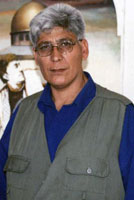‘Abu Ghraib is training camp for resistance’
Published Sep 24, 2005 8:19 PM
Following is a shortened version of an article by Lars Akerhaug, board
member of the Committee for a Free Iraq in Norway, that has been published in
Europe in several languages. It is based on an interview with former Abu Ghraib
prisoner Haj Ali al-Qaysi. Not many people would know this Iraqi man by his
name, but millions would recognize his photograph, his head in a hood, wearing a
black robe, his arms straight out, with electric wires attached.
Before U.S. occupation forces imprisoned him, Haj Ali worked
as a mukhtar or village chief in the Abu Ghraib district. He lectured in
mosques; harvested dates and ran a parking lot next to the local mosque. Haj Ali
clashed with the U.S. forces when they tried to dump chemicals, body parts and
pornography on some empty land he had converted into a playground for Iraqi
children.
He was arrested on Oct. 30, 2003. He met with a Captain
Phillips, who said, “I don’t know which agency has asked for your
arrest, but you’ll be held here.”
On the morning of the third
day of his detention, he was transported with a bag over his head to the
infamous Abu Ghraib prison. “Of course, at that time, I did not know where
I was,” Haj Ali says. “Before entering the prison I was inspected in
a very humiliating procedure” involving fingerprints, eye scans and tissue
samples.
Haj Ali describes the tortures he and the other prisoners were
subjected to, including sexual humiliations, deprivation of food and light, lack
of sleep, being held in horribly painful positions and constant threats. For
example, once he was put against a wall and his hands tied to a doorframe in
upright position. “Of course, again they beat me, poured urine and dirty
water on me, wrote on me, pulled an empty gun at me, used a loudspeaker to swear
in my ear and clicked the handcuffs in my ear. I stayed like this until the call
for morning prayer.”
The female prisoners were hostages for brothers
or fathers or sons. “We could hear their screams and do nothing but shout
Allahu Akbar! (God is great!).” One of his friends asked one of the female
U.S. soldiers, “Why do you humiliate us?” She answered, were the
orders, to humiliate the prisoners in this situation.”
Haj Ali says
that these prison camps are in fact training camps for the Iraqi Resistance.
“Ninety percent of those arrested were usually innocent, but once they get
out they are fully ready to start armed resistance against the occupiers. Anyone
being treated like this or who sees his brother or sister being treated like
this would be ready.”
Cell-phone cameras and
torture
Once he was taken to the interrogation room, where there were
10 people inside, some in military and some in civilian clothes. They had
telephones with cameras. “At that time I did not think this was possible,
and thought they used the phones for recording sound or something,” says
Ali. In this room the incident took place that later was screened around the
world as an example of the torture practiced by the U.S.
regime.
“They made me stand on a box with a robe on my head and arms
straight out in the air. They told me they would give me electric shocks. I did
not believe them. Then they took two wires and stuck them into my body. I felt
like my eyeballs were falling out. Then I fell to the
ground.”
During this torture he bit his tongue. The doctor came and
with his shoe pushed Haj Ali’s head cover away and put water on it.
“He saw no cut on the tongue” says Haj Ali, “so he told them
to continue.” “Usually,” says Ali, “the doctors were
part of the torture process. They would say if prisoners faked or exaggerated
pains, tell ing the interrogators to go ahead.”
Three times they
took him to this room and administered electric shocks to him five times. They
tied his hands and head to a tube in the ceiling and stuffed some dry bread in
his mouth. They took some photographs of him, and then continued with more
interrogation. During the questioning they would ask him, “What would you
think of more torture?” Haj Ali would answer that “The more you
torture us, the greater that God will reward us.”
“What I
later understood,” says Haj Ali, “was that what I was going through
was part of an operation called ‘Iron Horse,’ aimed at collecting
influential people, tribal leaders etc. to work for the occupation.” Haj
Ali refused to go along with this, telling his interrogators, “If you
define yourself as occupiers, then resisting the occupation force is preserved
in Islamic as well as international law.”
Haj Ali al-Qaysi, now
trained by the United Nations to work on human rights issues, will tell his
story at an internation al conference in Rome on Oct. 2. The full article is
posted at www.iacenter.org.
Articles copyright 1995-2012 Workers World.
Verbatim copying and distribution of this entire article is permitted in any medium without royalty provided this notice is preserved.
Workers World, 55 W. 17 St., NY, NY 10011
Email:
[email protected]
Subscribe
[email protected]
Support independent news
DONATE


